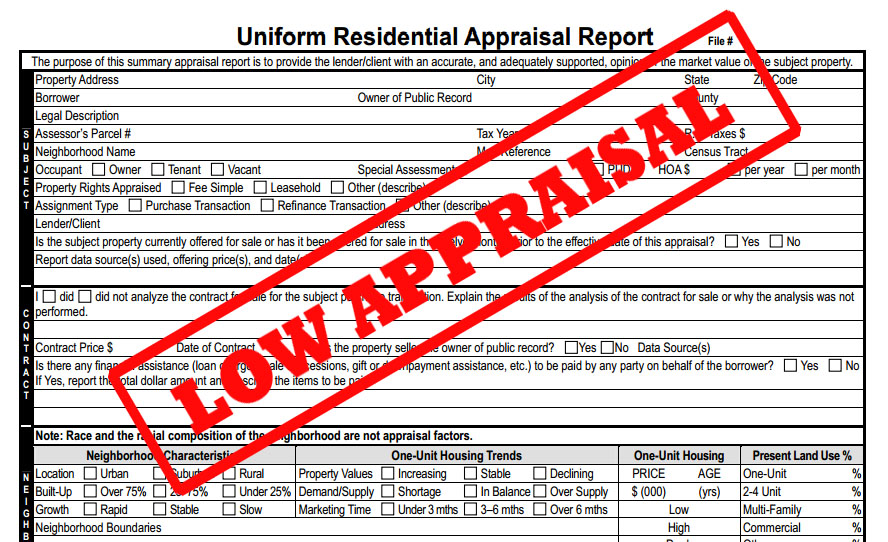LOW APPRAISALS: What are your options?

Published On: December 29, 2015 Posted by: Jeremy Peterson
One of the fastest ways to derail a real estate transaction is to have the appraisal come in lower than the contract sale price for a property. We like to think of the real estate market as the bastion of the free market. Buyers and sellers can transact freely and negotiate terms that are acceptable to each of them. However, given that mortgage lending is required for the majority of real estate transactions, there can be some hang ups when a lender gets involved.
Mortgage lenders are educated gamblers. When they issue a loan, they are placing an educated bet that the borrower (the buyer) is able to and willing to pay back the debt. Hence, the reams of verification paperwork required from buyers in order to process their loan application. Lenders want to know how borrowers earned their income, how long they earned it, and if it is likely to continue. They want to know how much other debt a borrower has and how good the borrower is at paying their debts. These all help establish a buyers ability to pay their mortgage.
Next, the lender wants to know if a borrow is willing to pay it. To hedge against this risk, the bank wants to know what their collateral looks like. Is the home “worth” the contract price? If the contract price is higher than similar homes in the neighborhood, would this borrower still be willing to pay the debt even though the home may be worth less than the debt owed? The Great Recession taught us that the answer to this question is often ‘No’. Also, if the bank has to take the home back in foreclosure, will they be able to recover their money? These are the motivating factors in requiring appraisals when banks issue a mortgage to a buyer.
When the appraisal comes in at the contract price or higher, everything works smoothly in the real estate transaction. But, I recently had a transaction where the appraisal came in lower than our contract price. What happens then?
If an appraisal comes in low, there are a couple options available. First, if the buyer feels discouraged by the whole process, Utah’s Real Estate Purchase Contract allows the buyer to excuse themselves from the transaction and receive their earnest money back as long as the appraisal was conducted and cancellation issued prior to the contract deadline. But, if a buyer feels that the sales price is reasonable and that the appraisal is in error, they can request a formal review of the appraisal. This is typically effective if sales comparables are found in the area to support the contract price. (NOTE: I have seen this work several times, though sometimes in degrees of effectiveness. An appraiser may concede that the value is higher than the original appraisal but still not full contract price.)
Sometimes the buyer believes the low appraisal to be a better value and the seller agrees to proceed. This is often the case in FHA appraisals. This is because FHA appraisals ‘stick’ to the property for 6 months. So, if the seller wanted to cancel the transaction and sell to another buyer at a higher value, they could only market it to conventional buyers and not FHA ones. If the home is being purchased with an FHA loan, it is highly likely that it is a starter home and a large percentage of other buyers who are in the market for that property are FHA buyers too. Sellers can find themselves unpleasantly stuck with a scarlet ‘FHA’ on their chest in such circumstances. Yet, if you are the buyer, it puts you in a strong negotiating position. In another scenario a buyer may want the home regardless of the appraisal. If they have enough cash on hand to bridge the gap between the sales price and the low appraisal, they can continue to move forward. I have seen this happen just a couple times. In this scenario, if the seller isn’t willing to negotiate, and the buyer doesn’t have the funds, the parties will terminate the sales contract and it gets tossed in the dust bin.
Having an appraisal come back low can really be a damper on your day. But, if you have the right professional help, you will know how to navigate the situation successfully to whatever outcome. If you are looking for a professional to help you in your next real estate transaction, CONTACT ME, and lets discuss your needs.



